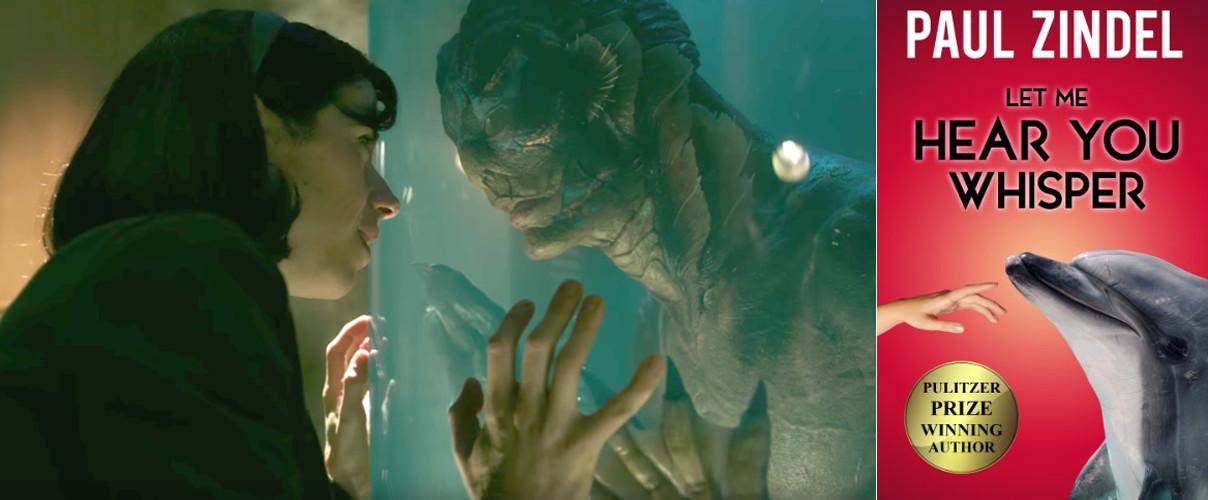You know Oscars season is in full swing when one of the Best Picture front-runners is suddenly under immense and seemingly random scrutiny. In an exclusive interview with The Guardian, the estate of Pulitzer Prize–winning playwright Paul Zindel is claiming that Guillermo del Toro cribbed the story of The Shape of Water from one of Zindel’s plays. “We are shocked that a major studio could make a film so obviously derived from my late father’s work without anyone recognizing it and coming to us for the rights,” David Zindel, who runs his father’s estate, told The Guardian via email.
The play in question, Let Me Hear You Whisper, is about a female janitor at a research lab who becomes enamored with one of the lab’s dolphins. The Shape of Water, of course, is about a female janitor (played by Sally Hawkins, who’s also up for an Oscar) who works at a government lab and falls in love with a humanlike, amphibious creature that somewhat resembles Abe Sapien from del Toro’s Hellboy. The two eventually have award-winning, though undeniably strange, fish sex. (In Let Me Hear You Whisper, there is no fish-on-human lovemaking.)
David Zindel pointed out other similarities between the two stories: In both, food is used by the women to initiate communication with the captive creatures; both of them dance with a mop in front of said creature; and both creatures escape the lab by hiding in a laundry cart. (Zindel somehow didn’t point out one other similarity that I find striking: A shot from The Shape of Water directly resembles the amazing — seriously, it’s so good — cover art for Let Me Hear You Whisper.)

Shocking stuff.
One key difference between works is the creatures themselves. In Zindel’s play, it’s a straight-up dolphin, while del Toro’s film features a fantastical fish-man who was captured somewhere in the Amazon and who also — spoiler alert — might be some type of god.
In a statement to The Guardian, the film’s distributor, Fox Searchlight, denied that the play was an inspiration, pointing out del Toro’s willingness to reference his influences in previous films. (This holds up: The director does tend to wear his influences on his sleeve, mainly Hammer horror films, H.P. Lovecraft, and Victoriana). “If the Zindel family has questions about this original work we welcome a conversation with them,” the studio added. Del Toro’s own explanation for the origin of The Shape of Water is that his friend, novelist Daniel Kraus, pitched a story to him about a “janitor that kidnaps an amphibian-man from a secret government facility.”
There are a lot of similarities between The Shape of Water and Let Me Hear You Whisper that don’t feel like mere happenstance. But creation is an amorphous affair, and it’s not easy to pinpoint where, when, or how an idea formulates in someone’s mind. It’s possible for two people to have similar ideas; it’s also possible for someone to sprout an idea based on anecdotes they don’t even realize are tied to an already-existing product. At the end of the day, The Shape of Water is a lovely, surprisingly risqué movie (mostly) deserving of its acclaim, regardless of where its story originated.
Why might this news be coming out this week, you ask? The same week in which The Shape of Water was nominated for 13 Oscars, the most of any 2017 film?
There is a historic precedent for Oscar movies getting picked apart in the lead-up to the awards show — see: Slumdog Millionaire and its controversial portrayal of India in 2009, Zero Dark Thirty and the scrutiny over its torture scenes in 2013, and the white-savior narrative that La La Land was saddled with last year. The Shape of Water — which has also begun to face criticism due to its depiction of a disabled person — isn’t the only Oscars front-runner this year that will be examined this rigorously: Three Billboards Outside Ebbing, Missouri is already a lightning rod of controversy because of its clumsy handling of race. Relatively speaking, Zindel’s claims feel less likely to affect The Shape of Water’s Oscar hopes. Compared with fundamental narrative issues on race, the potential plagiarism of a creature-person love story feels particularly trivial.

